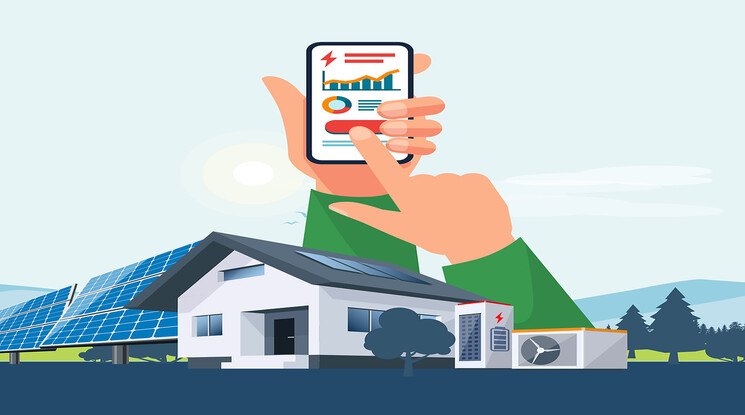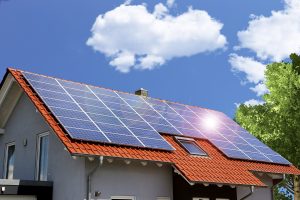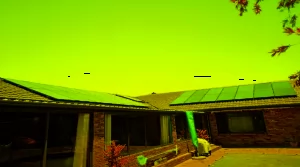In this age of increasing environmental awareness, many homeowners are turning to solar energy to power their homes. Solar panels in Virginia Beach are a clean and renewable energy source, and they can save you money on your electricity bills. But if you’ve already invested in solar panels, you might be wondering how to keep track of the energy your home is generating and using. Fortunately, there are ways to monitor your solar energy production and usage effectively.
Check Your Solar Inverter
One of the simplest ways to monitor your solar energy production is to check your solar inverter. The solar inverter is a crucial component of your solar panel system, as it converts the direct current (DC) electricity generated by your solar panels into the alternating current (AC) electricity that your home uses. Most inverters come with built-in monitoring systems that allow you to see how much energy your solar panels are producing.
To access this information, you can typically log in to a web portal or smartphone app provided by your inverter manufacturer. These platforms display real-time data, as well as historical information about your system’s performance. You can see details like the total energy generated, the current power output, and even daily, monthly, or yearly summaries.
Install a Separate Energy Monitoring System
If your solar inverter doesn’t provide sufficient data or if you want more comprehensive information about your home’s energy usage, you can consider installing a separate energy monitoring system. These systems are designed to provide a detailed breakdown of how much energy your solar panels produce and how much energy your home consumes.
A common type of energy monitor is a device that attaches to your electrical panel. It uses sensors to track the flow of electricity into and out of your home, giving you real-time insights into your energy usage. Many of these systems can be connected to your Wi-Fi network and provide you with user-friendly apps or web interfaces for monitoring purposes.
Check Your Utility Bill
Your utility bill is another valuable source of information when it comes to monitoring your solar energy usage. Most utility companies now offer “net metering” programs, which allow you to feed excess electricity generated by your solar panels back into the grid. In return, you can receive credits or even payments on your utility bill.
Your bill should include details about your energy consumption and any excess energy you’ve contributed to the grid. By comparing your energy production with your consumption, you can get a good idea of how your solar panel system is performing.
Third-Party Solar Monitoring Services
In addition to built-in or separate energy monitoring systems, there are third-party services and applications that can help you keep track of your solar energy production and usage. These services often integrate with your solar inverter or energy monitoring system to provide you with more detailed insights and data visualization.
These third-party services can be especially useful for homeowners who want to access their solar energy data from anywhere or those who prefer user-friendly and customizable interfaces for tracking their energy usage.
Monitor Your Energy Consumption Habits
Monitoring your solar energy production is essential, but understanding your energy consumption habits is equally important. The best way to maximize your solar energy benefits is to use electricity when your panels are generating power. This means running high-energy appliances or charging devices during peak sunlight hours.
You can make simple adjustments to your daily routine, such as running your dishwasher, doing laundry, or charging your electric vehicle during the sunniest parts of the day. By aligning your consumption with your solar production, you can save more money and reduce your reliance on the grid.
Set Energy Efficiency Goals
To truly make the most of your solar energy, consider setting energy efficiency goals for your home. Reducing your overall energy consumption not only maximizes your solar savings but also benefits the environment. Here are some ways to enhance your home’s energy efficiency:
- Upgrade to energy-efficient appliances and lighting.
- Improve insulation and seal gaps to prevent heat loss.
- Use programmable thermostats to optimize heating and cooling.
- Replace old windows with energy-efficient options.
- Unplug devices and chargers when they are not in use.
By taking steps to make your home more energy-efficient, you can decrease your dependence on both solar energy and the grid.
In Conclusion
Monitoring your solar energy production and usage is essential to make the most of your solar panel investment. Whether you use your solar inverter, a separate energy monitoring system, your utility bill, third-party services, or all of the above, understanding how much solar energy your home is using helps you save money, reduce your carbon footprint, and take control of your energy consumption.
Additionally, remember that responsible energy consumption habits and improving your home’s energy efficiency can amplify the benefits of your solar panels. By combining these efforts, you can enjoy a more sustainable and cost-effective way of powering your home with clean, renewable solar energy. So, start monitoring, optimizing, and enjoying the benefits of solar installation in Virginia Beach today!




